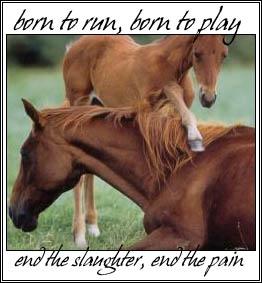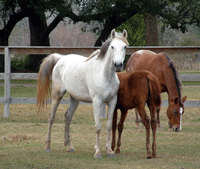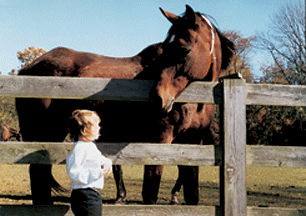
Posted Apr 30, 2010
by lauraallen Horse Slaughter
Update April 30: This week the chair of the Missouri Senate Agriculture, Food Production and Outdoor Resources Committee, Sen. Dan Clemens, publicly announced "there will be no further legislative progress on H.B. 1747".
While he was making that announcement, Rep. James Viebrock simply moved the provisions of H.B. 1747 to another unrelated bill, S.B. 795. The provisions of H.B. 1747 were attached to S.B. 795 which passed the House Agriculture Committee and could be voted on by the full House of Representatives as early as Monday, May 3, 2010. Find a copy of the House Committee Substitute bill here (http://www.senate.mo.gov/10info/pdf-bill/hcs/SB795.pdf).
WHAT YOU CAN DO
There is no time to waste: Find your Missouri state representative here (http://www.senate.mo.gov/llookup/leg_lookup.aspx). Find names and contact information for all Missouri state representatives here (http://www.house.mo.gov/member.aspx). Contact them (fax and phone are best) and urge them to vote NO to the House Committee Substitute, S.B. 795!
For more information about this bill, formerly H.B. 1747, and just how scary it could be for animal welfare laws, read Animal Law Coalition's earlier reports below.
Update April 11: H.B. 1747, a bill to promote horse slaughter has been assigned to the Missouri Senate Agriculture, Food Production and Outdoor Resources Committee.
Update April 1: H.B. 1747 has passed the Missouri House of Representatives by a vote of 91-61.
The version passed by the House is basically the same as the introduced bill, except for one significant change: If this bill becomes law, "[n]o law criminalizing or otherwise regulating crops or the welfare of any domesticated animals shall be valid unless based upon generally accepted scientific principles and enacted by the general assembly."
Scary language for animals.
This means there could be no citizen initiatives such as the current puppy mill ballot initiative for which advocates are now gathering signatures. If H.B. 1747 passes with this amendment, there could be no local laws regarding the welfare of any domesticated animal including dogs, cats, horses, other pets and farm animals that differ from state laws. Also, any current animal cruelty or animal welfare law in Missouri would be void unless it was "based upon generally accepted scientific principles and enacted by the general assembly." People charged with animal abuse could raise challenges to the law, claiming it was not based upon "generally accepted scientific principles". Possibly, all laws governing animal cruelty or welfare would simply be void because there was no determination of whether they were based upon "generally accepted scientific principles". Arguably, current regulations governing animal welfare and protection would be void as well for this lack of this determination and also because they are not enacted by the legislature; regulations are issued by state agencies.
But that is not all this bill does. It was originally introduced to promote horse slaughter and it still does that. Read Animal Law Coalition's report below for more on this bill and what else all of us must do to stop it.
Missouri state Rep. James Viebrock is the sponsor of H.B. 1747, which basically would also authorize registration and inspections for commercial horse slaughter for human consumption.
The bill proposes that the Missouri Dept. of Agriculture would register commercial horse slaughter operations and certify "that the parts of horses to be processed are fit for human food, and the processing establishment to be operated complies with ... sanitary standards". All registration and inspection fees collected" would "be paid to the director of agriculture and deposited into the state ‘Horse Meat and Product Fund'". Annual inspection fees would be used "to pay for USDA inspection of horse meat products and horse meat processing facilities."
According to the bill, H.B. 1747, "the [state] director [of Agriculture] shall make all necessary inspections and investigations" and the USDA would also have access "at all reasonable times to any building, room, vehicle, boat, or other premises in which any horse carcass, horse meat, or horse meat food product is processed, packed, transported, sold, exposed, or offered for sale at retail."
The USDA would be free to pay for samples or specimens of the carcass or "product" to determine if there are violations of USDA regulations.
The new law would have requirements for labeling, remedies to protect against adulteration, misbranding, failure to label or brand, or unfitness for human consumption. Places that serve horsemeat would be required to post conspicuous warning signs.
The proposal, of course, is simply another tactic to promote horse slaughter with the hope of forcing a return of horse slaughter to this country. This bill is similar to a number of bills and resolutions introduced in 2009 and several more this year, 2010, also offered in an effort to defeat the Prevention of Equine Cruelty Act, H.R. 503/S.B. 727, now pending in Congress and which would make it illegal to "possess..., ship..., transport..., purchase.., sell... deliver..., or receive" in interstate or foreign commerce any horse "with the intent that it is to be slaughtered for human consumption". The latest of these bills to pass as part of the pro-slaughter disinformation campaign is a Wyoming law that sadly promotes sending horses to slaughter but not to rescues or sanctuaries.
Right now, commercial horse slaughter for human consumption is illegal in the U.S. though horses can be transported to other countries, typically Mexico and Canada, for slaughter. Since 2006 Congress has de-funded ante-mortem inspections required to slaughter horses for human consumption. Congress continued the de-funding in the 2010Appropriations Act, Sec. 744.
In 2007 a federal court rejected an attempt by the USDA to allow horse slaughter operators to pay for the inspections. The USDA is currently not authorized to conduct ante-mortem inspections of horses to be slaughtered for human consumption. Without those inspections, it is illegal under the Federal Meat Inspection Act ("FMIA"), 21 U.S.C. §§601(w)(1), 603, to slaughter horses for human consumption.
If this bill becomes law, it is not clear the USDA would authorize Missouri state inspectors to conduct the required inspections. The funds to pay for the state as well as USDA inspections would come from horse slaughter operators, the same situation in the previous litigation. The judge in that case found the USDA violated the Administrative Procedure Act, 5 U.S.C. § 706 and the National Environmental Policy Act (NEPA) 42 U.S.C. § 4321, et seq., by failing to consider adequately, or, really, at all, the environmental impact of its action in allowing horse slaughter operators to pay for their own inspections.
Also, there is strong opposition to horse slaughter in the U.S., and the goal is to pass the Prevention of Equine Cruelty Act, H.R. 503/S.B. 727, to end this brutal practice altogether for all American horses. A similar bill passed the House of Representatives by an overwhelming majority in 2006, a vote of 263 to 146, but was never voted on in the Senate.
In 2007 a law in Texas, Texas Agriculture Code §§ 149.001-.007 was found to ban horse slaughter for human consumption and was upheld by the 5th Circuit Court of Appeals. A ban in Illinois, 225 ILCS 635, on horse slaughter for human consumption was upheld in 2008 by the 7th Circuit Court of Appeals. These state laws and court rulings closed the 3 facilities that were still slaughtering horses in the U.S.; those facilities were located in Texas and Illinois. (Go here to read about and help oppose state Rep. Jim Sacia's effort once again to overturn the Illinois ban on horse slaughter for human consumption; the Iliinois legislature and Illinois voters have never supported this effort. )
Horse slaughter is also illegal in California, CA Penal Code § 598c ("unlawful for any person to possess, to import into or export from the state, or to sell, buy, give away, hold, or accept any horse with the intent of killing, or having another kill, that horse, if that person knows or should have known that any part of that horse will be used for human consumption"). A Mississippi law, MS Code §75-33-3, states that the "term ‘food unfit for human consumption' shall be construed to include meat and meat-food products of horses and mules.". In Oklahoma, 63 Okla. Stat. §1-1136, it is "unlawful for any person to sell, offer or exhibit for sale . . . any quantity of horsemeat for human consumption."
In 2009 the Rhode Island House of Representatives issued a resolution in support of a federal ban on commercial horse slaughter for human consumption. A similar resolution is pending in California. A bill is pending in New York to ban commercial horse slaughter or trade in horse meat for human consumption. Wisconsin, Senate Bill 142 would also ban horse slaughter.
Go here to read how you can help pass the Prevention of Equine Cruelty Act, H.R. 503/S.B. 727, now pending in Congress (http://www.animallawcoalition.com/horse-slaughter/article/567).
Are you doing all you can to make this world a better place to live in?






